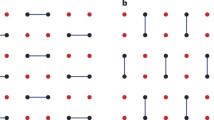Abstract
Understanding quantum speed-up over classical computing is fundamental for the development of efficient quantum algorithms. In this paper, we study such problem within the framework of the quantum query model, which represents the probability of output \(x \in \{0,1\}^n\) as a function \(\pi (x)\). We present a classical simulation for output probabilities \(\pi \), whose error depends on the Fourier 1-norm of \(\pi \). Such dependence implies upper-bounds for the quotient between the number of queries applied by an optimal classical algorithm and our quantum algorithm, respectively. These upper-bounds show a strong relation between Fourier 1-norm and quantum parallelism. We show applications to query complexity.

Similar content being viewed by others
Explore related subjects
Discover the latest articles, news and stories from top researchers in related subjects.Notes
For details and up-to-date examples, the reader may refer to S. Jordan, Quantum Algorithm Zoo, https://math.nist.gov/quantum/zoo/.
References
Aaronson, S.: Limitations of quantum advice and one-way communication. In: Proceedings of 19th IEEE Annual Conference on Computational Complexity, pp. 320–332. IEEE (2004)
Aaronson, S.: BQP and the polynomial hierarchy. In: Proceedings of the Forty-Second ACM Symposium on Theory of Computing, pp. 141–150. ACM (2010)
Aaronson, S., Ambainis, A.: The need for structure in quantum speedups. Theory Comput. 10(6), 133–166 (2014)
Aaronson, S., Ambainis, A., Iraids, J., Kokainis, M., Smotrovs, J.: Polynomials, quantum query complexity, and Grothendieck’s inequality. In: Proceedings of the 31st Conference on Computational Complexity, CCC’16, pp. 25:1–25:19. Schloss Dagstuhl–Leibniz-Zentrum fuer Informatik, Germany (2016). https://doi.org/10.4230/LIPIcs.CCC.2016.25
Abbott, A.A., Calude, C.S.: Understanding the quantum computational speed-up via de-quantisation. In: Cooper, S.B., Panangaden, P., Kashefi, E. (eds.) Proceedings Sixth Workshop on Developments in Computational Models: Causality, Computation, and Physics, Edinburgh, Scotland, 9–10th July 2010, Electronic Proceedings in Theoretical Computer Science, vol. 26, pp. 1–12. Open Publishing Association (2010). https://doi.org/10.4204/EPTCS.26.1
Ambainis, A.: Quantum walk algorithm for element distinctness. SIAM J. Comput. 37(1), 210–239 (2007)
Ambainis, A., Gruska, J., Zheng, S.: Exact quantum algorithms have advantage for almost all Boolean functions. Quantum Inf. Comput. 15(5–6), 435–452 (2015)
Angluin, D., Valiant, L.G.: Fast probabilistic algorithms for hamiltonian circuits and matchings. J. Comput. Syst. Sci. 18(2), 155–193 (1979)
Barnum, H., Saks, M., Szegedy, M.: Quantum query complexity and semi-definite programming. In: Proceedings of the 18th IEEE Annual Conference on Computational Complexity, pp. 179–193 (2003). https://doi.org/10.1109/CCC.2003.1214419
Beals, R., Buhrman, H., Cleve, R., Mosca, M., De Wolf, R.: Quantum lower bounds by polynomials. J. ACM 48(4), 778–797 (2001)
Bell, J.S.: On the problem of hidden variables in quantum mechanics. Rev. Mod. Phys. 38(3), 447 (1966)
Buhrman, H., De Wolf, R.: Complexity measures and decision tree complexity: a survey. Theor. Comput. Sci. 288(1), 21–43 (2002)
Datta, A., Shaji, A., Caves, C.M.: Quantum discord and the power of one qubit. Phys. Rev. Lett. 100(5), 050502 (2008)
Datta, A., Vidal, G.: Role of entanglement and correlations in mixed-state quantum computation. Phys. Rev. A 75(4), 042310 (2007)
De Wolf, R.: A brief introduction to fourier analysis on the Boolean cube. Theory Comput. Grad. Surv. 1, 1–20 (2008)
Deutsch, D.: Quantum theory, the Church–Turing principle and the universal quantum computer. In: Proceedings of the Royal Society of London A: Mathematical, Physical and Engineering Sciences, vol. 400, pp. 97–117. The Royal Society (1985)
Deutsch, D., Jozsa, R.: Rapid solution of problems by quantum computation. In: Proceedings of the Royal Society of London A: Mathematical, Physical and Engineering Sciences, vol. 439, pp. 553–558. The Royal Society (1992)
Grillo, S., Marquezino, F.: Quantum query as a state decomposition. Theor. Comput. Sci. 736, 62–75 (2018). https://doi.org/10.1016/j.tcs.2018.03.017
Howard, M., Wallman, J., Veitch, V., Emerson, J.: Contextuality supplies the ’magic’ for quantum computation. Nature 510(7505), 351–355 (2014)
Jozsa, R.: Entanglement and quantum computation. In: Huggett, S.A., Mason, L.J., Tod, K.P., Tsou, S.T., Woodhouse, N.M.J. (eds.) The Geometric Universe: Science, Geometry, and the Work of Roger Penrose, vol. 27, pp. 369–379. Oxford University Press, Oxford (1998)
Jozsa, R., Linden, N.: On the role of entanglement in quantum-computational speed-up. In: Proceedings of the Royal Society of London A: Mathematical, Physical and Engineering Sciences, vol. 459, pp. 2011–2032. The Royal Society (2003)
Knill, E., Laflamme, R.: Power of one bit of quantum information. Phys. Rev. Lett. 81(25), 5672 (1998)
Kochen, S., Specker, E.P.: The problem of hidden variables in quantum mechanics. In: Hooker, C.A. (eds.) The Logico-Algebraic Approach to Quantum Mechanics, vol. 5a, pp. 293–328. Springer, Dordrecht (1975). https://doi.org/10.1007/978-94-010-1795-4_17
Montanaro, A.: Some applications of hypercontractive inequalities in quantum information theory. J. Math. Phys. 53(12), 122206 (2012)
O’Donnell, R.: Analysis of Boolean Functions. Cambridge University Press, Cambridge (2014)
Ozols, M., Roetteler, M., Roland, J.: Quantum rejection sampling. ACM Trans. Comput. Theory 5(3), 11 (2013)
Reichardt, B.W., Spalek, R.: Span-program-based quantum algorithm for evaluating formulas. In: Proceedings of the Fortieth Annual ACM Symposium on Theory of Computing, pp. 103–112. ACM (2008)
Rötteler, M.: Quantum algorithms for highly non-linear Boolean functions. In: Proceedings of the Twenty-First Annual ACM-SIAM Symposium on Discrete Algorithms, pp. 448–457. SIAM (2010)
Vidal, G.: Efficient classical simulation of slightly entangled quantum computations. Phys. Rev. Lett. 91(14), 147902 (2003)
Acknowledgements
The authors thank R. Portugal, S. Collier, J. Szwarcfiter, and E. Galvão for useful discussions and suggestions. This work was initiated while SAG was at the Federal University of Rio de Janeiro, Brazil. This study was financed in part by the Coordenação de Aperfeiçoamento de Pessoal de Nível Superior - Brasil (CAPES) - Finance Code 001, and Fundação de Amparo à Pesquisa do Estado do Rio de Janeiro - Brasil (FAPERJ), JCNE Grant E-26/203.235/2016.
Author information
Authors and Affiliations
Corresponding author
Additional information
Publisher's Note
Springer Nature remains neutral with regard to jurisdictional claims in published maps and institutional affiliations.
Rights and permissions
About this article
Cite this article
Grillo, S.A., de Lima Marquezino, F. Fourier 1-norm and quantum speed-up. Quantum Inf Process 18, 99 (2019). https://doi.org/10.1007/s11128-019-2208-7
Received:
Accepted:
Published:
DOI: https://doi.org/10.1007/s11128-019-2208-7




